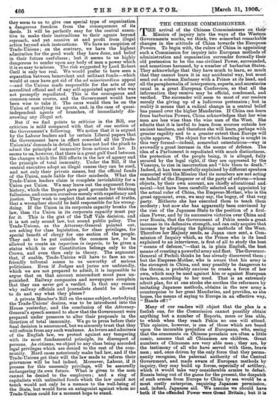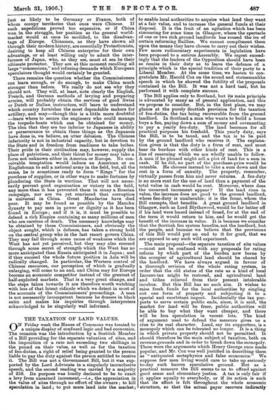THE CHINESE COMMISSIONERS.
THE arrival of the Chinese Commissioners on their. Mission of inquiry into the ways of the Western Governments marks, we think, two somewhat remarkable changes in the -attitude of China towards -the European, Powers. To begin with, the rulers of China in appointing such a Commission for inquiry into European methods of administration and organisation surrender formally their old pretension to be the one civilised Power, surrounded, and sometimes harassed, by a number of barbarian States. They acknowledge that they have much to learn, so much that they cannot learn it in any accidental way, but must send out a solemn Embassy with a Prince at its head, and. all the paraphernalia of interpreters, experts, and secretaries usual in a. great European Conference, so that all the information they receive may be official, condensed, and verified. The surrender will seem to most of our readers merely the giving up of a ludicrous pretension ; but in reality it means that a radical change in a central belief has passed over the higher Mandarins. If China can learn from barbarian Powers, China acknowledges that her wise men are less wise than the wise men of the West. She admits that it is lawful to learn from sources outside her ancient teachers, and therefore she will learn, perhaps with greater rapidity and to a greater extent than Europe will quite approve. The object for which learning is sought in this very formal—indeed, somewhat ostentatious—way is avowedly a great increase in the means of defence. The idea of a Parliament is repudiated with much distinctness, the protection of the people being, it is alleged, fully secured by the legal right, if they are oppressed by the Viceroys, to rise in insurrection and "bite them to death." Indeed, it has been carefully explained by different speakers connected with the Mission that its members are not acting on behalf of the Emperor or of the party of reform—whose objects, by their own account, are chiefly educational and moral—but have been carefully selected and appointed by the actual ruler of China, the Empress-Mother, who is the great opponent, even, we may say, the bogey, of that very. party. Hitherto she has executed them to teach them modesty ; but now she has apparently been convinced by the rise of the Japanese State to the position of a first- class Power, and by its successive victories over China and over Russia, that the Government of Pekin needs a great increase in its defensive strength, and can only acquire that increase by adopting the fighting methods of the West. Therefore her Majesty sends, as Japan once sent, a Com- mission of Inquiry which, as the Prince who is its head explained to an interviewer, is first of all to study the best "means of defence,"—that is, in plain English, the best means of creating a powerful army and fleet. The Governor- General of Pechili thinks he has already discovered them ; but the Empress-Mother, who is aware that his army is the strongest in China, and may possibly be dangerous to the throne, is probably anxious to create a force of her own, which may be used against him or against European invaders, according to her need. That is an extremely adroit plan, for at one stroke she soothes the reformers by imitating Japanese methods, obtains in the new army a counterpoise to her great Mandarins, and provides, as she hopes, the means of saying to Europe in an effective way, "Hands off ! "
Many of our readers will object that the plan is a foolish one, for the Commission cannot possibly obtain anything but a number of Reports, more or less able, to which when they reach Pekin no one will attend. This opinion, however, is one of those which are based upon the incurable prejudice of Europeans, who, seeing that the ornaments on Chinese porcelain are often a little comic, assume that all Chinamen are children. Great numbers of Chinamen are very able men ; they are, by the testimony of all who have served with them, brave men • and, once driven by the only force that they perma- nently recognise, the paternal authority of the Central Government, and made aware of European methods by inquiry, they may build up forces, especially of artillery, which it would take very considerable armies to defeat. Russia being out of the game for the present, the despatch of such armies from Europe to China by sea would be a most costly enterprise, requiring Japanese permission,, and, indeed, Japanese aid. We assume we should have both if the offended Power were Great Britain; but it is just _ as likely to be Germany or France, both of whom occupy territories that once were Chinese. If such expeditions proved too expensive, or if China won in the struggle, her position as the general world- market would at once be modified, to the disadvan- tage of Europe. Chinamen, as they have shown all through their modern history, are essentially Protectionists, desiring to keep all Chinese enterprise for their own advantage, or at least willing only to admit the inter- ference of Japan, who, as they see, must at sea be their ultimate protector. They are at this moment recalling all large "concessions," and refusing demands which European speculators thought would certainly be granted.
There remains the question whether the Commissioners can learn enough, or do enough, to make China much stronger than before. We really do not see why they should not. They will, at least, note clearly the English, French, and German methods of levying and preparing armies, will probably obtain the services of good Swiss or Dutch or Italian instructors, will learn to understand which country furnishes the most dependable makers for artillery, and may—though this is a little more doubtful —learn where to secure the engineers who could manage the torpedo-boats which can be obtained for money. The idea that they are too inferior to Japanese in ability or perseverance to obtain these things as the Japanese have done is, we believe, an utter delusion. The Chinese inferiority is not in industrial capacity, but in devotion to the State and in freedom from readiness to take bribes. Their pride in their civilisation may, however, supply the place of patriotism, and their thirst for money may take a form not unknown either in America or Europe. No con- ceivable temptation would induce an American or an Englishman to sell a national army in the field, but, all the same, he is sometimes ready to form " Rings " for the purchase of supplies, or in other ways to make fortunes by plundering the State in wartime. That will not neces- sarily prevent good organisation or victory in the field, any more than it has prevented them in many a Russian campaign, nor are we yet convinced that corruption is universal in China. Great Mandarins have died poor. It may be found as possible by the Manchu dynasty to pay men in power or dignity as it has been found in Europe ; and if it is, it must be possible to defend a rich Empire containing so many millions of men who are careless of death. The necessary knowledge may be obtained by these Commissioners, and obviously the object sought, which is defence, has taken a strong hold on the central group who in the last resort govern China. They may fail through some cause of weakness which the West has not yet perceived, but they may also succeed through some secret of strength which the West has no more anticipated than Russia anticipated it in Japan ; and if they succeed the whole future position in Asia will be radically changed. In particular, the Western control of Chinese resources, our perception of which is gradually enlarging, will come to an end, and China may for Europe become an economic competitor instead of the greatest of half-exploited markets. That is a very great change, and the steps taken towards it are therefore worth watching with less of that latent ridicule which we detect in most of the accounts of the Commissioners' proceedings. A man is not necessarily incompetent because he dresses in black satin and makes his inquiries through interpreters acknowledged to be singularly well informed.











































 Previous page
Previous page